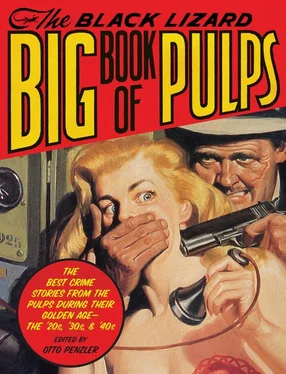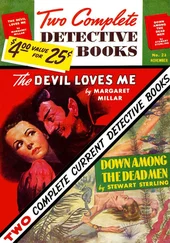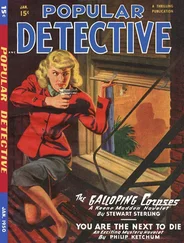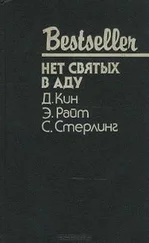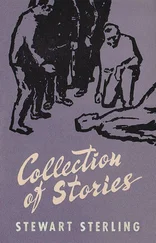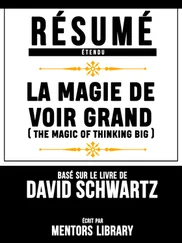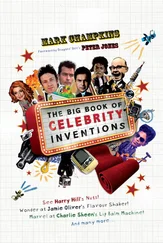When her escort took her arm and led her across the great central lobby, toward the subway entrance, she evidently protested. She made her way to one of the marble shelves alongside the ticket windows, pointed vehemently to the pad. “Willard” began to write, furiously...
Teccard bought a newspaper, unfolded it, kept it in front of his face so he could just see over the top. He edged, unobtrusively, within a dozen feet.
“But I don’t understand.” Helen gazed at “Willard” in obvious fascination. “You’re so much better-looking. Why did you send me the other man’s photograph?”
The youth favored her with a dazzling smile, proffered her a sheet from the pad.
She read it, crumpled it, seemed to thrust it into the pocket of her jacket. “I would have liked you even more, Peter — if you had trusted me — told me the truth.”
They moved on toward the Lexington Avenue subway. Willard was having difficulty holding up his written end of the conversation. He kept setting the bag down, scribbling rapidly, then seizing her arm and rushing her along again.
Teccard followed them through the stile, downstairs to the uptown platform. They boarded the rear of one crowded car. The lieutenant squeezed onto the front platform of the car behind. He saw Helen’s hand release the crumpled paper, before she was pushed into the car. People surged in like a mob pressing to the scene of a fire. Teccard struggled through the door over the car-couplings, into the space Helen had just vacated. He stooped, retrieved the paper.
He held it down at his side, unfolded it.
I wanted to be certain you were not attracted to me merely because of my looks, darling. That’s why I sent you the other picture. Now I am sure you will love me, for what I really am — not merely what I seem to be. Is that not better, dear one?
Teccard spat out a sibilant, jammed the paper in his pocket. The doors closed, the train rumbled out of the station.
He searched the crowded car aisle, ahead. They must have found seats somehow.
He unfolded the paper again, elbowed his way slowly forward.
They were nowhere in the car. Long before the brakes had screamed for the Eighty-sixth Street stop, he knew they were nowhere on the train.
Chapter Five
Primrose Path
Teccard was in a cold rage as he shoved through the throng and up to Eighty-sixth Street. “Willard” had made a sucker of him with the old on-agin, off-agin, Finnegan — gone in the rear door, made his way, with Helen in tow, up by the side door at the middle of the subway car and — at the last instant — stepped off to the platform while the lieutenant was perusing the note Helen had dropped.
Of course, the sergeant couldn’t have stopped the man without giving her hand away. Of course, also, “Willard” must have caught a glimpse of Teccard. Now, the make-love-by-mail guy would be on his guard — and likely to suspect Helen. Teccard had dragged her into this mess, by requesting her assignment from the Policewomen’s Bureau. Now she was literally in the hands of a cold-blooded killer!
By force of habit, he called the Telegraph Bureau first, to get the alarm out for the dark-haired youth. The description was complete now. Teccard was good at estimating weight, height, age. Long experience in the Criminal Identification Bureau made him remember points that the average policeman wouldn’t have noticed. “His ears are funny. Kind of pointed, at the top of the helix. He brushes his hair to cover them as much as he can. And his chin looks as if somebody had started to drive a wedge into it. And don’t forget, this man is sure to be armed and dangerous.”
Then he called Captain Meyer, repeated the description.
“Send a car around to check every man on beat, will you, Cap? Odds are good he hangs out in this parish somewhere. Have ’em keep an eye out for Sergeant Dixon, she’ll be with him.”
He had half expected to find a report from her, waiting for him when he called his office. He was wrong about that. The office didn’t have much — there hadn’t been any prints on the cellophane, too many on the knobs and furniture in the Eighty-eighth Street room. They hadn’t been able to find any of record, though.
Talking with the Telegraph Bureau had given him an idea. He called Western Union, located the night traffic manager. “There was a bunch of flowers wired from this city to Miss Marion Yulett in Algers, upstate, sometime this a.m. Chances are, they went through Floral Telegraph Delivery. Find out what shop put in the order, will you? Buzz me back.”
He fumed and stewed in the drugstore phone booth for what seemed like an hour. When he passed the clock over the soda fountain, on his way out, he found it had been seven minutes.
The address the telegraph company had given him was only a few blocks away. He didn’t bother with a cab, but went on the run. Over to Second, up to Eighty-seventh. There it was, next to the undertaker’s place in the middle of the block.
THE REMEMBRANCE SHOP.
Potted ivy and cactus in the window, flanked by lilies and dried grasses in tin vases — inside, a glass-front icebox with cut flowers, roses and carnations.
Carnations! Now he knew why that fragrance in the closet had reminded him of church, there had always been a big bunch of white carnations in front of the pulpit, when he was a kid. “Willard” must have had a carnation in the buttonhole of the coat he hung up in the closet...
A girl stood talking to the shirt-sleeved man behind the counter. As Teccard walked in she was saying: “You’ll send those wreaths over to the sexton right away? He’s waiting for them.”
The florist nodded impatiently. “I’ll get ’em right over, right away.” He turned inquiringly toward the lieutenant. “What can I do for you, sir?”
Teccard drew a deep breath. This was the man in the snapshot! Round face, goatee, receding hair! “You can tell me who ordered some lilies of the valley wired to a lady up in Algers, New York.”
“Was there some complaint?” asked the florist.
“Just checking up on the person who sent them. I’m from the police department.”
The girl paused, on her way out, to stare at him out of stolid blue eyes set deep in a square, pleasant face.
“Police! What’s the matter the police should come around?” The man waved his arms, excitedly.
Teccard said softly: “You have a duplicate record of your F.T.D. orders. Let’s see it.”
The florist ran stubby fingers through his hair, dug a flat, yellow book out of the debris on a bookkeeping desk. He ruffled the pages. “It ain’t against the law, sending flowers like this!”
The carbon copy of the wired order wasn’t helpful. All it indicated was that Peter Forst had paid two dollars and fifty cents to have a corsage delivered to Miss Marion Yulett at Algers.
“Who took the order?”
“Nobody. The envelope was under the door when I’m opening the shop this morning. With the cash. What’s the matter, eh?”
Teccard’s hand clamped on the other’s wrist. “You sent those posies yourself, Mr. Forst.”
“Forst! What’s it, Forst?” The man’s eyes narrowed. “I’m George Agousti, I run this business, no nonsense. I pay taxes.”
The lieutenant’s grip remained firm. “Then someone’s been framing you, Agousti.”
“Framing me? For what!”
“Murder.” Teccard spoke quietly.
Agousti recoiled as from a blow. “It’s terrible mistake you making. So much as a single flea, I ain’t ever hurt.”
“You don’t know this Peter Forst?”
“The first time I ever hear his name, so help me!”
“What about Harold Willard? Heard of him?”
The florist shook his head.
Читать дальше
